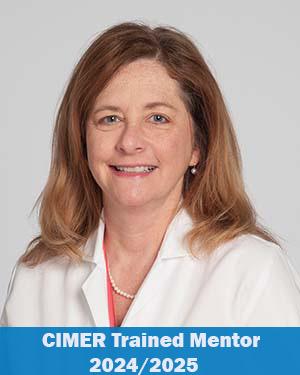Research News
02/27/2025
Combination therapies unlock options for EGFR, CDK4/6 inhibitors
Blocking two genes may resensitize triple negative breast cancer to CDK4/6 inhibitors and EGFR inhibitors, respectively, and improve their use in other cancers.

Cleveland Clinic researchers have identified two potential combination therapies that could re-sensitize treatment-resistant triple-negative breast cancer (TNBC) to medication. One therapy combines cyclin dependent kinase (CDK) 4/6 inhibitors with compounds that block the gene NEK2. The second shows that inhibiting the YES1 protein can improve the response to EGFR inhibitors in treatment-resistant TNBC.
Both studies come from the laboratory of Ruth Keri, PhD, who leads Cleveland Clinic's Breast Cancer Center of Excellence and acts as Associate Director for Basic Research in the Case Comprehensive Cancer Center. The collaborative research illustrates how understanding the biology of treatment-resistant tumors can provide new opportunities for therapy.
“TNBC is used as a catch-all term because it is classified by what cancer cells lack (receptors for estrogen, progesterone and HER2),” says Jessica Bobbitt, a PhD student in the Keri Lab. “Tumors within this group look and act differently from each other. To treat them, we need many different therapeutic options, as well as some ability to foresee what treatment might be the most beneficial for a patient with a particular type of tumor.”
Overcoming resistance to CDK4/6 inhibitors
CDK4 and CDK6 act like traffic lights for cell division and replication. Inhibiting these proteins turns a “green light” into a “red light,” stopping cancer progression. However, a subset of tumors resist inhibitors to these proteins. Increasing the dose of the therapy can become toxic at high levels, Bobbitt explains.
To work around the resistant tumors, Bobbitt looked at other roles CDK4 and CDK6 play in cells. Some studies had suggested that CDK4 and CDK6 could prevent a form of genetic instability called aneuploidy. Cells with aneuploidy have extra copies of their chromosomes, which in some cases can lead to destruction of the cell. In a study published in the Journal of Biological Chemistry, Bobbit stimulated the acquisition of aneuploidy in TBNC cells by blocking a second aneuploidy regulator called NEK2 in addition to inhibiting CDK4 and CDK6 in preclinical models.
“Cancer cells often upregulate NEK2, which can result in adaptive levels of aneuploidy, meaning it's helpful to the tumor,” she says. “We showed that inhibiting NEK2 switches the cells to having maladaptive levels of aneuploidy, meaning it causes the cancer cell to die when combined with CDK4/6 inhibitors.”
Overcoming resistance to EGFR-inhibitors
While Bobbitt studied a way to overcome CDK4/6 resistance in TNBC, former Keri Lab graduate student Leslie Cuellar-Vite, PhD, wanted to know how to combat cancers that resist a different type of treatment: EGFR inhibitors.
EGFR is a signaling molecule involved in cell division, survival and inflammation. Mutations in this gene can lead to EGFR-driven cancers that replicate uncontrollably. EGFR inhibitors treat EGFR-driven cancer by stopping the overactive signals. This works well in some cases, but not in others.
“Triple-negative breast cancer has lots of EGFR molecules, but for some reason it doesn’t respond as well as lung cancer does to the inhibitors,” Dr. Keri shared with Cleveland Clinic podcast Cancer Advances. “It's probably because you have to give so much drug that you get into the toxic range before you can actually inhibit the growth of the cancer.”
Dr. Cuellar-Vite published a combination therapy in Molecular Cancer Research that successfully allowed EGFR inhibitors to treat TNBC without toxic side effects. This is because the protein she inhibited, YES1, helps control how many EGFR molecules are present in the cell. Lower levels of EGFR require lower levels of EGFR inhibitors, meaning the treatment can be administered at nontoxic doses. The combination therapy also worked in treatment resistant EGFR-driven lung cancer, again by reducing the number of EGFR molecules and increasing the response to EGFR inhibitors.
Advancing potential TNBC combination therapies
A different Keri Lab researcher, MD/PhD student Natasha Ingles-Martinez, recently reported that treatment-resistant TNBC could also be re-sensitized to taxane therapy by inhibiting YES1. Dr. Cuellar-Vite says that their combined findings provide enough evidence to justify testing multiple combination therapies with YES1 inhibitors in clinical trials.
Dr. Cuellar-Vite, Bobbitt and Ingles-Martinez all worked closely together on their research projects and are co-authors on each other's respective papers. They all share the same goal: expanding the options an individual has available to treat their cancer.
“CDK4/6 inhibitors and EGFR inhibitors are both approved for many types of cancers, but only in individuals with specific mutations that already leave them vulnerable to the treatment,” Dr. Cuellar-Vite explains. “Both of our projects assess combination therapies that expand their utility in other cancer types that may not be currently treated based on today's guidelines – some due to treatment resistance, and some due to disqualifying mutations. I am most excited about the potential for new clinical trials that mindfully incorporate other cancers where a clinical benefit is possible to improve the lives of those cancer patients.”
Featured Experts
News Category
Related News
Research areas
Want To Support Ground-Breaking Research at Cleveland Clinic?
Discover how you can help Cleveland Clinic save lives and continue to lead the transformation of healthcare.
Give to Cleveland Clinic